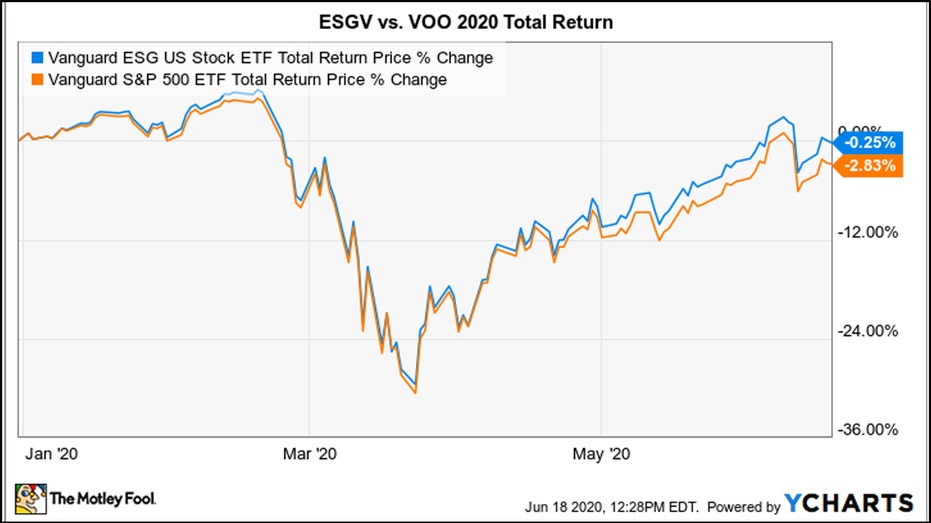This investing strategy is beating the market amid a pandemic
Could following this strategy be a good fit for you?
This has been an unnerving year for investors. COVID-19 went from a minor news story in China to a full-blown global pandemic. Government lockdowns took effect, business activity ground to a halt, and U.S. stocks witnessed their fastest bear market in history.
HEALTH, TECH STOCKS DRIVING MARKETS: INVESTING EXPERT
Then, amazingly, the markets came roaring back to life. During these incredibly volatile times, an investing strategy called ESG has continued to gain popularity, and its followers have outperformed the market throughout this crazy time.
Could following this strategy be a good fit for you?
The ABCs of ESG
ESG means investors pick which stocks they buy based on certain environmental, social, and governance criteria in addition to the usual business metrics.
For example, some investors want to invest in businesses that are actively trying to reduce their impact on the environment. This might mean that the companies disclose their greenhouse gas emissions, work to lower their carbon footprint, purchase renewable forms of energy, or take other environmentally friendly actions.
NEW CORONAVIRUS SPIKE SHORT-CIRCUITS STOCK MARKET REBOUND
Other investors emphasis companies that score well in certain social areas. This could include businesses that provide above-average pay and benefits to their employees, work to improve their supply chain to only source ethically produced products, or take public stances on certain social justice issues.
Governance is a bit of a wonky category, but investors who focus their attention here want to make sure that a company is set up to ensure that all of its key stakeholders prosper, not just one or two. Companies that do well in this area tend to do a good job at aligning their management team's incentives with outside shareholders' interests, separate the chairman and CEO roles, emphasize gender and racial diversity in the board of directors and management teams, and more.
The performance
What's exciting about ESG investing is that investors don't have to sacrifice returns to gain these benefits. In fact, investing with ESG factors in mind can often lead to higher returns.
RECORD NUMBER OF BIG MONEY MANAGERS SAY STOCKS OVERVALUED AFTER CORONAVIRUS RALLY
For example, let's compare an ESG-focused exchange-traded fund (ETF), the Vanguard ESG US Stock ETF, to a similarly sized, non-ESG focused ETF: in this case, the Vanguard S&P 500 ETF.
Stocks In This Article:
On the surface, these two funds are quite similar. They both hold hundreds of stocks in a wide variety of sectors. They each have the majority of their assets focused on large businesses. They each charge low expense ratios, and both of their top 10 holdings have a lot of overlap, too.
FOREIGN INVESTORS TO BE BIGGEST BUYERS OF US STOCKS: GOLDMAN SACHS
But the ESG ETF also includes an extra set of screening criteria that emphasize ESG factors. These include:
- Only investing in companies that score well in certain ESG areas.
- Excluding companies from industries such as adult entertainment, alcohol, tobacco, weapons, fossil fuels, gambling, and nuclear power.
- Excluding stocks that do not meet standards of U.N. global compact principles.
- Excluding companies that do not meet certain diversity criteria.
Here's how these two seemingly similar funds are performing since the start of 2020:

And here's how these two funds have performed since the ESGV was launched on Sept. 18, 2018:

In both cases, the ESGV has outperformed the VOO by two or three percentage points. That might not seem like much, but when compounded over a lifetime, those extra few percentage points can potentially lead to thousands of dollars (or even millions) in extra returns.
INFLATION DOG MAY FINALLY BARK, INVESTORS BET
Before you write this performance off as just a fluke, you should know that there is data that backs up ESG investing. An asset management company called Arabesque found that companies in the S&P 500 that ranked in the top quintile of ESG attributes outperformed those in the bottom quintile by more than 25 percentage points between the beginning of 2014 and the end of 2018. What's more, the companies that received the highest ESG scores were also less volatile on average.
What can explain the outperformance? While there are likely to be a lot of factors at play, here are a few that could be working in ESG companies' favor:
- These companies could have a lower risk of regulatory headaches or suffering reputational damage.
- ESG companies might be able to retain their employees longer, which lowers training and hiring costs.
- Companies with high levels of diversity in leadership roles have access to a wider range of viewpoints so they can make more-informed decisions.
- Customers might be more loyal to companies if they believe the business is doing good in the world.
- The millennial generation, which is rapidly increasing its buying power, is generally shown to be supportive of socially responsible companies.
Could ESG be right for you?
ESG investing is really catching on with investors in a big way. As of 2018, roughly one out of every four investing dollars under management was being put to work with at least some ESG principles in mind. That totaled nearly $12 trillion in assets, which is an 18-fold increase from 1995. The demand for this philosophy of investing is likely to continue, too.
So if you are interested in doing good in the world, increasing your returns, and lowering your volatility, then ESG investing might be right up your alley.




















